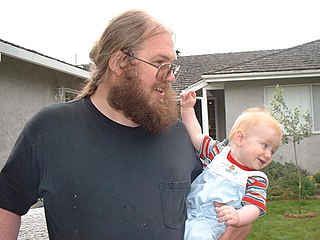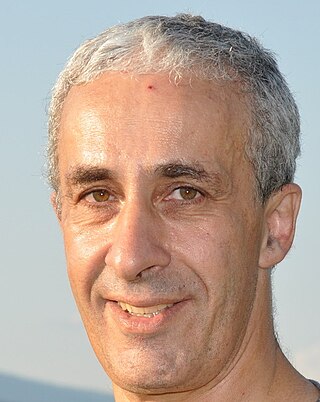Related Research Articles
Computer vision tasks include methods for acquiring, processing, analyzing, and understanding digital images, and extraction of high-dimensional data from the real world in order to produce numerical or symbolic information, e.g. in the form of decisions. "Understanding" in this context signifies the transformation of visual images into descriptions of the world that make sense to thought processes and can elicit appropriate action. This image understanding can be seen as the disentangling of symbolic information from image data using models constructed with the aid of geometry, physics, statistics, and learning theory.

David A. Forsyth is a South-African-born American computer scientist and the Fulton Watson Copp Chair in Computer Science the University of Illinois at Urbana–Champaign.
Articulated body pose estimation in computer vision is the study of algorithms and systems that recover the pose of an articulated body, which consists of joints and rigid parts using image-based observations. It is one of the longest-lasting problems in computer vision because of the complexity of the models that relate observation with pose, and because of the variety of situations in which it would be useful.

Pedestrian detection is an essential and significant task in any intelligent video surveillance system, as it provides the fundamental information for semantic understanding of the video footages. It has an obvious extension to automotive applications due to the potential for improving safety systems. Many car manufacturers offer this as an ADAS option in 2017.
Andrew Zisserman is a British computer scientist and a professor at the University of Oxford, and a researcher in computer vision. As of 2014 he is affiliated with DeepMind.
The International Conference on Computer Vision (ICCV) is a research conference sponsored by the Institute of Electrical and Electronics Engineers (IEEE) held every other year. It is considered to be one of the top conferences in computer vision, alongside CVPR and ECCV, and it is held on years in which ECCV is not.
The Conference on Computer Vision and Pattern Recognition is an annual conference on computer vision and pattern recognition.
The European Conference on Computer Vision (ECCV) is a biennial research conference with the proceedings published by Springer Science+Business Media. Similar to ICCV in scope and quality, it is held those years which ICCV is not. It is considered to be one of the top conferences in computer vision, alongside CVPR and ICCV, with an 'A' rating from the Australian Ranking of ICT Conferences and an 'A1' rating from the Brazilian ministry of education. The acceptance rate for ECCV 2010 was 24.4% for posters and 3.3% for oral presentations.
Pushmeet Kohli is a computer and machine learning scientist at Google DeepMind where he holds the position of Vice President of research for the "Secure and Reliable AI" and "AI for Science and Sustainability". Before joining DeepMind, he was partner scientist and director of research at Microsoft Research and a post-doctoral fellow at the University of Cambridge. Kohli's research investigates applications of machine learning and computer vision. He has also made contributions in game theory, discrete algorithms and psychometrics.
Stefano Soatto is professor of computer science at the University of California, Los Angeles (UCLA), in Los Angeles, CA, where he is also professor of electrical engineering and founding director of the UCLA Vision Lab.

Pascal Fua is a computer science professor at EPFL. He received an engineering degree from École Polytechnique, Paris, in 1984 and a Ph.D. in computer science from the University of Orsay in 1989. He joined EPFL in 1996. Before that, he worked at SRI International and at INRIA Sophia-Antipolis as a computer scientist.

Raquel Urtasun is a professor at the University of Toronto. Urtasun uses artificial intelligence, particularly deep learning, to make vehicles and other machines perceive the world more accurately and efficiently.
Jiebo Luo is a Chinese-American computer scientist, the Albert Arendt Hopeman Professor of Engineering and Professor of Computer Science at the University of Rochester. He is interested in artificial intelligence, data science and computer vision.

Michael J. Black is an American-born computer scientist working in Tübingen, Germany. He is a founding director at the Max Planck Institute for Intelligent Systems where he leads the Perceiving Systems Department in research focused on computer vision, machine learning, and computer graphics. He is also an Honorary Professor at the University of Tübingen.
Michal Irani is a professor in the Department of Computer Science and Applied Mathematics at the Weizmann Institute of Science, Israel.
Sanja Fidler is an associate professor at the University of Toronto and Director of AI at Nvidia. She is also a co-founder of the Vector Institute, University of Toronto and Canada CIFAR AI Chair. Her research is in the areas of computer vision and artificial intelligence.
Yanxi Liu is a Chinese-American computer scientist specializing in computer vision. She is known for her research on computational symmetry, computational regularity, and the uses of symmetry and regularity in computer vision, as well as on feature selection for motion tracking. She is a professor of computer science at Pennsylvania State University, where she directs the Motion Capture Lab for Smart Health and co-directs the Lab for Perception, Action and Cognition.
Jiaya Jia is a Chair Professor of the Department of Computer Science and Engineering at The Hong Kong University of Science and Technology (HKUST). He is an IEEE Fellow, the associate editor-in-chief of one of IEEE’s flagship and premier journals- Transactions on Pattern Analysis and Machine Intelligence (TPAMI), as well as on the editorial board of International Journal of Computer Vision (IJCV).
Wang Gang, also known as Michael Wang, is an electrical and computer engineer and academic specializing in Artificial Intelligence and its application in autonomous driving. Wang has authored or co-authored more than 100 publications, cited over 28,000 times. His h-index is computed to be 72.

Philip Torr FREng, FRS, is a British scientist and a professor at the University of Oxford, and a researcher in machine learning and computer vision.
References
- ↑ "PhD Thesis Lourdes Agapito" (in Spanish). Retrieved 8 March 2020.
- ↑ "University College London - Department of Computer Science" . Retrieved 10 March 2020.
- ↑ "Synthesia" . Retrieved 10 March 2020.
- ↑ "The Executive Committee of the BMVA". British Machine Vision Association. Retrieved 8 March 2020.
- ↑ "Active Vision Laboratory" . Retrieved 8 March 2020.
- ↑ "UCL Institutional Research Information Service" . Retrieved 8 March 2020.
- ↑ "Reuters and Synthesia unveil AI prototype for automated video reports". Thomson Reuters. 7 February 2020. Retrieved 8 March 2020.
- ↑ "Dubbing is coming to a small screen near you". The Economist Group Limited. 21 December 2019. Retrieved 8 March 2020.
- ↑ "Women Leading Visual Tech: Lourdes Agapito On Synthetic Media". LDV Capital. 2020-08-06. Retrieved 2023-07-11.
- ↑ "Prof. Lourdes Agapito". University College London. Retrieved 8 March 2020.
- ↑ "BMVA News" (PDF). Vol. 27, no. 3. British Machine Vision Association and Society for Pattern Recognition. March 2017. Retrieved 8 March 2020.
- ↑ "European Research Grants" . Retrieved 8 March 2020.
- ↑ "The British Machine Vision Conference (BMVC)". British Machine Vision Association and Society for Pattern Recognition. Retrieved 8 March 2020.